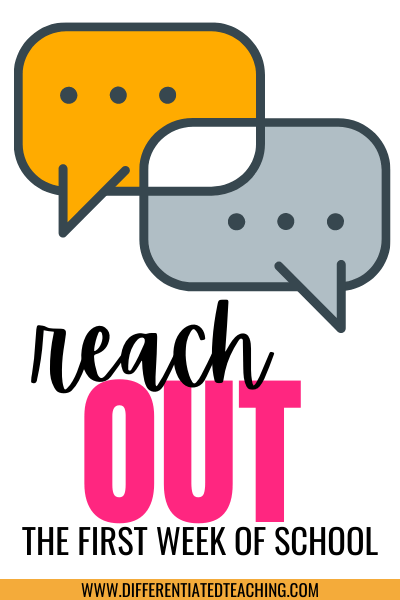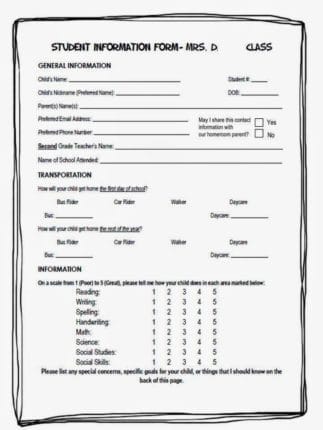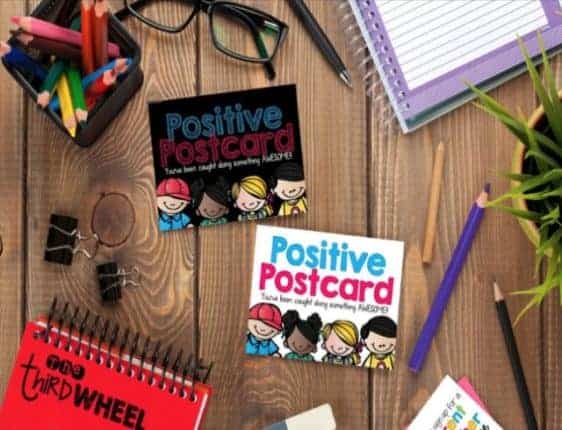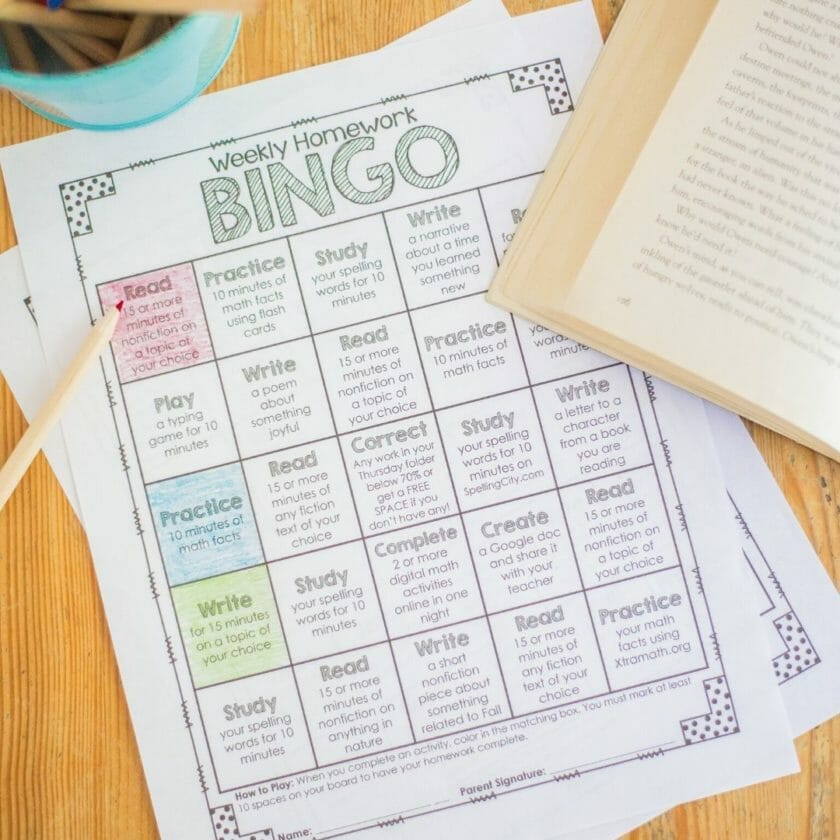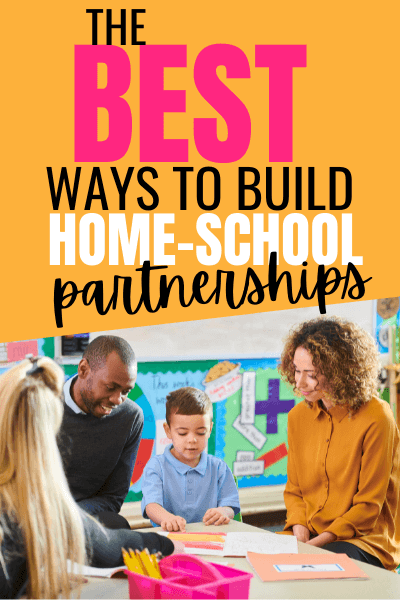9 Ways to Build Strong Home-School Relationships this School Year
One of the most important factors in having a successful school year is having strong relationships with your students’ families. This can be one of the most shocking revelations new teachers experience when they are given their first classroom. We prepare for the lessons each day but are never fully prepared for the work it takes to build strong home-school relationships.
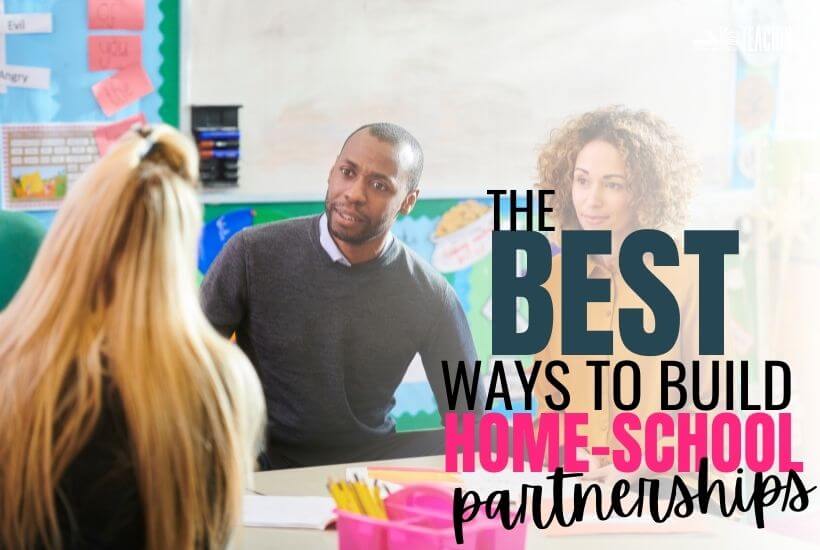
Ideas for Fostering Home-School Partnerships from the First Day of School
For many teachers, especially those who are new to the profession, this can be uncomfortable and nerve-wracking. Even though there is almost no chance that you can please everyone, there are some strategies that you can implement each school year to foster a positive relationship with your students’ parents.
1. Make building home-school relationships a goal for Open House.
This is your first opportunity to set the groundwork for the kind of relationship you expect with your families. Be open and honest about your expectations and make it known that you are always putting their child first.
One way of beginning the discussion is to share the poem, Unity, with the attending adults. This is a great way to share the sentiments that you have about working with parents. The poem makes it very clear that the most successful way to make each child’s school year great is by working together.
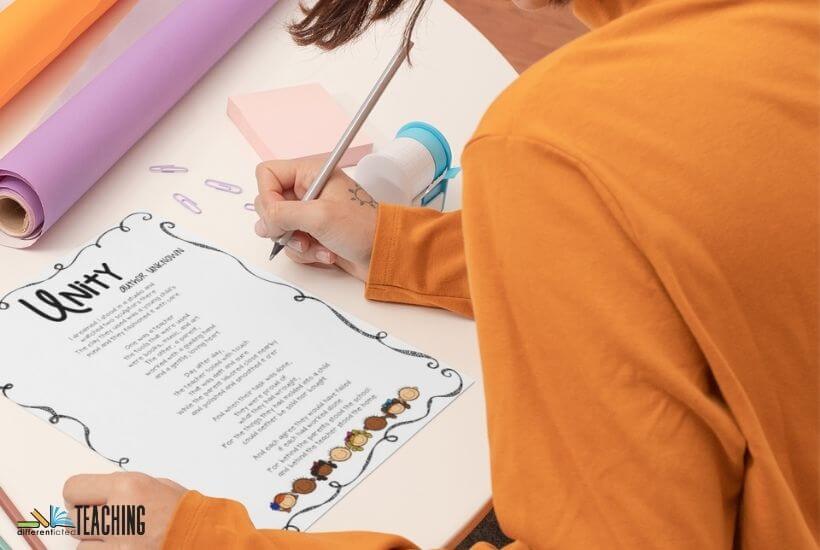
Stop considering parent night as a speech about what you’ll teach this year. Instead, use it as an opportunity! Discuss what can be done at home to assist what you do in the classroom. Then, spend time making connections.
It’s also a great chance to let them know what you’re letting them off the hook for this year. For example, I loved telling parents that this was the year to build responsibility. They no longer needed to worry about dropping off forgotten lunches, snacks, and homework because we were working to build responsibility. Many parents were visibly relieved that I wasn’t about to judge their parenting because they couldn’t sneak away from work to bring up a forgotten lunchbox.
I always kept these items related to what the child should be able to do independently at their current grade level.
I also let parents know that I had a secret snack stash, could get their child a school lunch and that the consequence for homework was not that terrible. While their child might not get EXACTLY what they were hoping for, it was a chance to learn a life lesson about responsibility.
If the students see that both the parents and the teachers are on the same page, they begin to recognize that their family and teachers present a united front and want to support their success together.
Click here to read more about how I prepare for Back-to-School Night and get some great tips.
2. Reach out the first week of school to get the ball rolling.
One of the best ways that you can begin to open the lines of communication with families is by reaching out by the end of the first week of school.
As a parent, I can guarantee if you send an email to each family with a positive statement about their child, it will impress them that you have already shown interest in their child.
And, more importantly, you are sending out a positive interaction right from the start.
Too many times parents think that when they hear from the teacher that it must mean something bad has happened.
You can easily change that trend with a positive email in the first week or so. This will signal to the parents that you care. It also says you’re approachable and are looking for the best in their child.
These positive interactions will do wonders when you may have to have an uncomfortable discussion with a parent. They will have already seen you care and that you are looking out for their child from previous encounters.
3. Try to understand the child from the parents’ perspective.
It can be easy to forget you’re teaching someone’s baby when you’ve got a class of 30 or you’re working with 100+ students due to departmentalization. However, this reality colors every interaction you have with families.
Teachers have a very different perspective on the students because they see them in a completely different light. However, when issues arise, it is important to try to put yourself in the parents’ shoes. Even requests or complaints that may seem (or be) unreasonable, come from a place of concern for their child and his education.
Yes, at times, parents have tunnel vision when it comes to their children. However, 99% of the time these come from a place of a parent just trying to do their best and they’re looking for your support, not judgment. (Even those strange requests like, “Can you get my kid to shower daily?”…definitely WAY outside my lane on that one!)
To help you get a better understanding of how parents view their child and their hopes for them this school year, you should ask them. I promise they’ll be eager to tell you more than you might ever want to know.
Getting to know your students is an important part of creating a classroom community.
When you first connect, you might take a few minutes to ask if there is anything they want to share in regards to what has been a successful learning tactic in the past. This can start your home-school relationship off on the right foot because it acknowledges that parents know their children best.
Or, you can also send home the link to a Google Survey or Student Information Sheet, like the one below, in which the parents can give you some early information about how they learn best in school.
4. Communicate regularly via weekly or monthly newsletters.
A great way to keep parents involved in what is happening in your classroom is by sending home a monthly newsletter. You can do this electronically or you can create a classroom webpage for parents to view.
This gives you the opportunity to explain upcoming assignments and projects, things parents can do to help contribute to the classroom, and any special events that may be happening at the school. It also helps parents start the conversation about school at home if their child is young and forgets what happens during the day or is not so eager to chat.
Family-school partnerships can also be fostered digitally these days! Check out Common Sense Education for a variety of apps and websites that you can use to enhance communication between home and school.
Many offer two-way communication that protects your personal information and phone number. This can be an innovative way to reach out to older students to remind them about upcoming assignments or announcements, as well as keep the parents in the loop.
5. Reconsider your approach to parent conferences.
Teachers can develop a lot of anxiety around parent-teacher conferences. Let’s be honest, it can be hard to look a parent in the face and tell them their child is struggling or not meeting standards..or worse that, you are noticing significant classroom behavior issues that need to be addressed. However, there are both times it is critical to connect with families.
At the most basic level, you’re likely to be required to have conferences with families each fall. If you’re easily overwhelmed by the volume of conferences you’ll be having this year, look at this as an opportunity to brag about all the wonderful things their child has been doing and discuss some ways to make the rest of the school year more successful. Every parent enjoys hearing the positive first, even if you’ve got some negatives to share after.
Called the “sandwich method”, finding ways to couch concerns between positive statements is a well-known strategy regularly used in the business world for dealing with bad news, conflict, or issues that must be addressed. Based on principles of interpersonal psychology, it’s a great tool to use for those tough parent conversations, too!
That being said, one of the reasons for the anxiety is that teachers don’t know what to expect from parents when they come for a conference.
You can easily assuage some of these fears by sending home a Pre-Conference Form for parents to fill out a week before the conference is scheduled to occur. This will give you an idea of what concerns or issues they may have.
By seeing this ahead of time, you will be able to prepare a response or a strategy to help their child out. This will help the flow of the meeting go smoothly so that you can help in the navigation of the conversation.
6. Make personal connections apart from academics.
It can be easy to get into a rhythm that has you connecting with families over academic achievement. However, it is just as important that you consider how you’ll foster family-school partnerships beyond just grades and test scores.
Positive postcards are a great way to foster relationships with families because they allow you to acknowledge more than just student achievement.
You can praise relationship skills when you see a student doing an amazing job welcoming a new student to class, or acknowledge student agency when you notice a learner taking personal responsibility. It truly doesn’t need to be a huge achievement at school to warrant some acknowledgment.
Effective partnerships are more easily achieved when parents know you see their child as more than just their academic successes or failures.
7. Make connections during Family Curriculum Nights
Many elementary and primary schools host nights for the specific subject matter. Your campus might host a Math Night or Literacy Night during the fall semester. Yes, it can often feel like one more thing on your already full plate. However, it is also a great chance to get to know families.
Many times these nights include activities such as pizza, craft making, games, etc. These can be opportunities for you to build meaningful bonds with families who attend.
If you have not yet had this opportunity, now would be a good time to start planning ahead! You may want to consider hosting a Family Fun Night at the beginning of the school year. If there isn’t anything planned by school leaders, this is a fun way to start home-school relationships.
Educational board games can be a fun way to bring families together and foster classroom community. This event can kick off some amazing home-school partnerships. It can also help to build relationships between families in your class.
Just be sure to check with your school principal first!
8. Be real and reasonable if you want to foster strong home-school relationships.
It can be really easy to get bogged down in the minutia as a teacher. We begin creating plans for what our expectations will be as a new school year begins. Despite our best intentions, our plans don’t align with the realities many families are currently dealing with.
When setting expectations for things like homework, be sure to consider whether you’re asking for something reasonable. Flexibility, through things like Homework Choice Boards, can offer busy families a chance to build homework routines that match their lives.
Consider the goal of the activities you assign.
Having parents sign planners nightly may seem like a great way to foster accountability and keep parents in the loop. However, it can quickly devolve into just another thing parents have to do. They’re likely already at capacity with the same tasks you are dealing with at your own home each night.
That’s not to say having parents check the planner isn’t worthwhile, but consider the true goal of the activity.
Are you trying to build student responsibility?
Teach organization skills?
Get students to communicate about their school day?
Regardless of your goal, you may want to consider whether daily signatures are necessary. Might it be better to ask families to sign once a week?
Similarly, you’ll want to consider how you’ll address planners that aren’t signed or don’t meet expectations. It can be easy to make this a punishment for the child. Remember that for many students, this is completely outside their control.
Nothing will ruin a home-school partnership faster than attempting to micromanage parent-child interactions.
9. Be flexible and consider factors that might be influencing parents’ attitudes about school.
This can be hard when you’re juggling the demands of your own family with those of school leaders. However, it is important to try to maintain a positive attitude when extenuating circumstances arise for families.
Schedules may make active participation difficult.
One of the most common of these is the inability to attend parent-teacher conferences. Being open to out-of-the-box ways to connect can be hard, but it can make a huge difference when it comes to an effective partnership.
Many of these aren’t hugely difficult to achieve. For example, you might consider virtual or telephone conferences if parents can’t attend in person due to work schedules.
Overcoming the language barrier
Many of us are teaching in communities with a variety of linguistic backgrounds. If your class has many English learners, you might ask if your district has translators. This lets you send information home to parents in their native languages. It’s well worth finding out how to get access to this support.
Utilizing their native language for any form of communication can help build comfort. And it can also help parents feel confident seeking out meaningful involvement and volunteering. Of course, it will also allow you to better connect with them and their children.
Recognizing parent’s experiences may influence their involvement,
For some parents, hesitancy may stem from their own school experiences. Whether they had difficulty with academics or experienced other negative encounters with school, it is important to seek out opportunities to build home-school relationships.
It is also important that their experience as a parent isn’t the same as their experience as a student. For those in secondary schools, it can be helpful to connect with other teachers to share a consistent message. Having school staff on the same page can help when students are working with a handful of teachers each day.
Focus on family engagement is hard, but strong home-school relationships so worthwhile…
Despite your best efforts to create strong home-school partnerships, there will likely be a few issues that arise during the year. It goes without saying that some of our bigger headaches will be as a result of a parent problem.
When this happens, don’t be afraid to take a deep breath, relax, and confidently know you can handle the situation.
If you stay active and communicate as often as you can, you will never be blindsided by something. Parents will feel much more comfortable talking to you if you have already had pleasant exchanges in the past.
Teaching is what you love to do and the parents love to see their child succeed and be happy. Once they can see that you have the same goal, home-school relationships can be more productive and positive.
“Education is a shared commitment between dedicated teachers, motivated students, and enthusiastic parents with high expectations.” -Bob Beauprez

